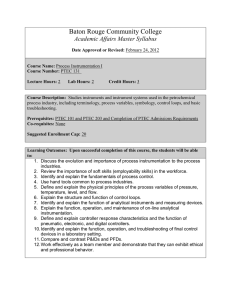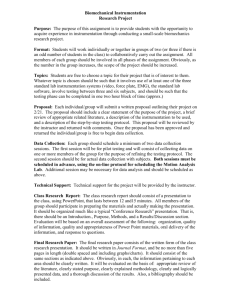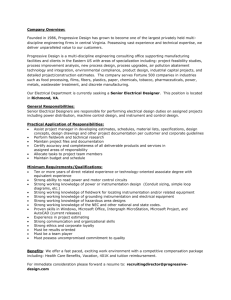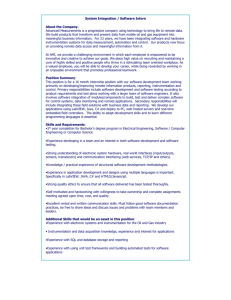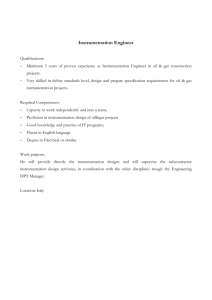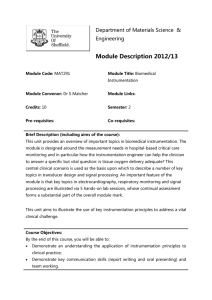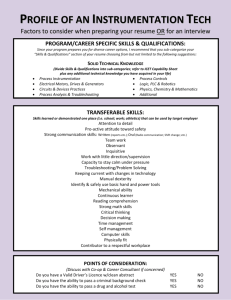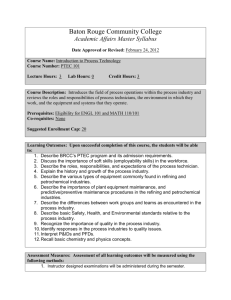Baton Rouge Community College Academic Affairs Master Syllabus
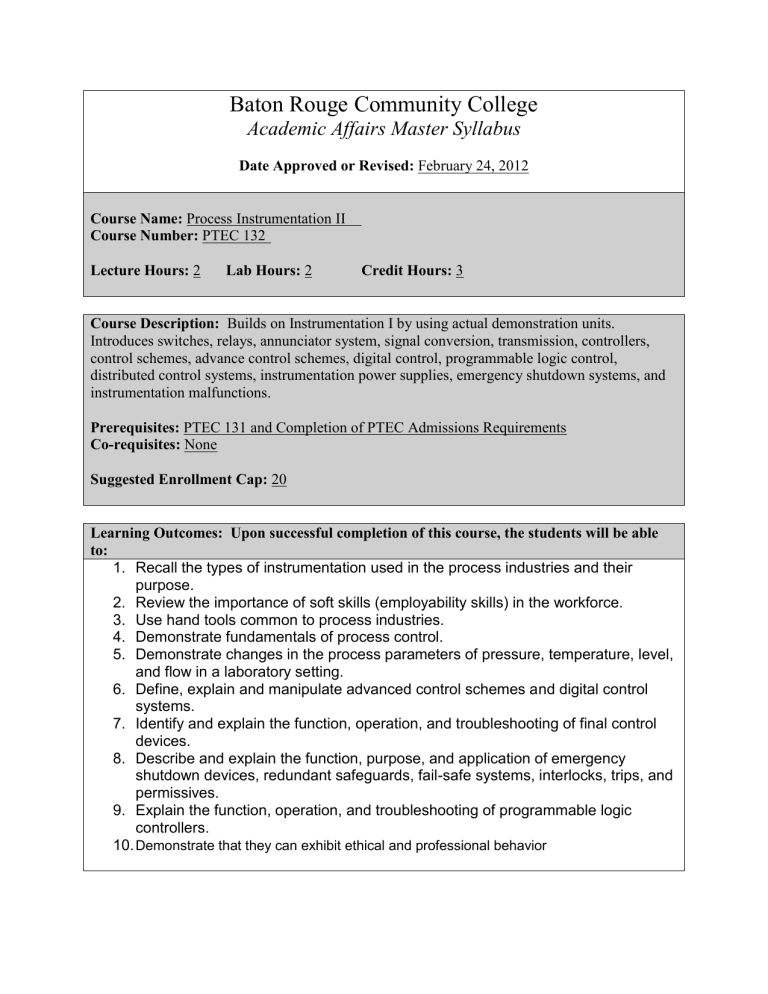
Baton Rouge Community College
Academic Affairs Master Syllabus
Date Approved or Revised: February 24, 2012
Course Name: Process Instrumentation II
Course Number: PTEC 132
Credit Hours: 3 Lecture Hours: 2 Lab Hours: 2
Course Description: Builds on Instrumentation I by using actual demonstration units.
Introduces switches, relays, annunciator system, signal conversion, transmission, controllers, control schemes, advance control schemes, digital control, programmable logic control, distributed control systems, instrumentation power supplies, emergency shutdown systems, and instrumentation malfunctions.
Prerequisites: PTEC 131 and Completion of PTEC Admissions Requirements
Co-requisites: None
Suggested Enrollment Cap: 20
Learning Outcomes: Upon successful completion of this course, the students will be able to:
1. Recall the types of instrumentation used in the process industries and their purpose.
2. Review the importance of soft skills (employability skills) in the workforce.
3. Use hand tools common to process industries.
4. Demonstrate fundamentals of process control.
5. Demonstrate changes in the process parameters of pressure, temperature, level, and flow in a laboratory setting.
6. Define, explain and manipulate advanced control schemes and digital control systems.
7. Identify and explain the function, operation, and troubleshooting of final control devices.
8. Describe and explain the function, purpose, and application of emergency shutdown devices, redundant safeguards, fail-safe systems, interlocks, trips, and permissives.
9. Explain the function, operation, and troubleshooting of programmable logic controllers.
10. Demonstrate that they can exhibit ethical and professional behavior
Assessment Measures: Assessment of all learning outcomes will be measured using the following methods:
1. Practical test in the glass labs using troubleshooting techniques learned, removing and restoring instruments and valves from/to service, and performing automatic to manual and manual to automatic transfer functions.
2. Computer Based Training (CBT) Modules will be used to evaluate concepts.
3. Instructor designed examinations will be administered during the semester.
4. A final examination will be administered at the end of the semester.
5. Included with the final exam will be a departmentally designed section of questions which will be the same for all classes and all instructors.
6. The common portion of the final exam will cover all of the learning outcomes. This portion of the exam may, a t the instructor’s option, be used or not in determining the grade on the final exam.
7. Instructor will use a checklist to periodically assess soft skills.
Information to be included on the Instructor’s Course Syllabi:
Disability Statement: Baton Rouge Community College seeks to meet the needs of its students in many ways. See the Office of Disability Services to receive suggestions for disability statements that should be included in each syllabus.
Grading: The College grading policy should be included in the course syllabus. Any special practices should also go here. This should include the instructor’s and/or the department’s policy for make-up work. For example in a speech course, “Speeches not given on due date will receive no grade higher than a sixty” or “Make-up work will not be accepted after the last day of class.”
Attendance Policy: Include the overall attendance policy of the college. Instructors may want to add additional information in individual syllabi to meet the needs of their courses.
General Policies:
Instructors’ policy on the use of things such as beepers and cell phones and/or hand held programmable calculators should be covered in this section.
Cheating and Plagiarism: This must be included in all syllabi and should include the penalties for incidents in a given class. Students should have a clear idea of what constitutes cheating in a given course.
Safety Concerns:
In some programs this may be a major issue. For example, “No student will be allowed in the safety lab without safety glasses.” General statements such as, “Items that may be harmful to one’s self or others should not be brought to class.”
Library/ Learning Resources: Since the development of the total person is part of our mission, assignments in the library and/or the Learning Resources Center should be included to assist students in enhancing skills and in using resources. Students should be encouraged to use the library for reading enjoyment as part of lifelong learning.
Expanded Course Outline:
I.
Course Overview & Instrumentation Review
II.
Soft Skills (Employability Skills)
III.
Regulators, Switches, Relays and Enunciators
IV.
Signal Transmission and Conversion
V.
Controllers
VI.
Control Schemes
VII.
Advanced Control Schemes
VIII.
Introduction to Digital Control
IX.
Programmable Logic Control
X.
Distributed Control Systems (DCS)
XI.
Instrumentation Power Supply
XII.
Emergency shutdown (ESD), Interlocks, and Protective Devices
XIII.
Instrumentation Malfunctions
